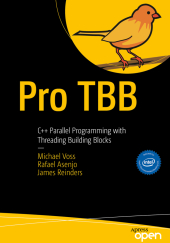 Neuerscheinungen 2019Stand: 2020-02-01 |
Schnellsuche
ISBN/Stichwort/Autor
|
Herderstraße 10
10625 Berlin
Tel.: 030 315 714 16
Fax 030 315 714 14
info@buchspektrum.de |

Rafael Asenjo, James Reinders, Michael Voss
(Beteiligte)
Pro TBB
C++ Parallel Programming with Threading Building Blocks
1st ed. 2019. lxvi, 754 S. 154 SW-Abb., 460 Farbabb. 254 mm
Verlag/Jahr: SPRINGER, BERLIN; APRESS 2019
ISBN: 1-484-24397-8 (1484243978)
Neue ISBN: 978-1-484-24397-8 (9781484243978)
Preis und Lieferzeit: Bitte klicken
This open access book is a modern guide for all C++ programmers to learn Threading Building Blocks (TBB). Written by TBB and parallel programming experts, this book reflects their collective decades of experience in developing and teaching parallel programming with TBB, offering their insights in an approachable manner. Throughout the book the authors present numerous examples and best practices to help you become an effective TBB programmer and leverage the power of parallel systems.
Pro TBB starts with the basics, explaining parallel algorithms and C++´s built-in standard template library for parallelism. You´ll learn the key concepts of managing memory, working with data structures and how to handle typical issues with synchronization. Later chapters apply these ideas to complex systems to explain performance tradeoffs, mapping common parallel patterns, controlling threads and overhead, and extending TBB to program heterogeneous systems or system-on-chips.
What You´ll LearnUse Threading Building Blocks to produce code that is portable, simple, scalable, and more understandable
Review best practices for parallelizing computationally intensive tasks in your applications
Integrate TBB with other threading packages
Create scalable, high performance data-parallel programs
Work with generic programming to write efficient algorithms
Who This Book Is For
C++ programmers learning to run applications on multicore systems, as well as C or C++ programmers without much experience with templates. No previous experience with parallel programming or multicore processors is required.
Preface Part I Chapter 1: Jumping Right In - "Hello, TBB!" Chapter 2: Generic Parallel Algorithms Chapter 3: Flow Graphs Chapter 4: TBB and the C++ Parallel Standard Template Library Chapter 5: Synchronization: why and how to avoid it Chapter 6: Data Structures for Concurrency Chapter 7: Scalable Memory Allocation Chapter 8: Mapping Parallel Patterns to TBB
Part II Chapter 9: The Pillars of Composability Chapter 10: Using tasks to create your own algorithms Chapter 11: Controlling the Number of Threads Used for Execution Chapter 12: Using Work Isolation for Correctness and Performance Chapter 13: Creating Thread-to-core and Task-to-thread Affinity Chapter 14: Using Task Priorities Chapter 15: Cancellation and Exception Handling Chapter 16: Tuning TBB Algorithms: Granularity, Locality, Parallelism and Determinism Chapter 17: Flow Graphs: Beyond the Basics Chapter 18: Beef up Flow Graphs with Async Nodes Chapter 19: Flow Graphs on steroids: OpenCL Nodes Chapter 20: TBB on NUMA architectures
Appendix A: History and Inspiration Appendix B: TBB Précis Glossary


